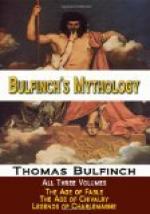CHAPTER XVI
SIR PALAMEDES
While Sir Tristram and the fair Isoude abode yet at La Joyeuse Garde, Sir Tristram rode forth one day, without armor, having no weapon but his spear and his sword. And as he rode he came to a place where he saw two knights in battle, and one of them had gotten the better and the other lay overthrown. The knight who had the better was Sir Palamedes. When Sir Palamedes knew Sir Tristram, he cried out, “Sir Tristram, now we be met, and ere we depart we will redress our old wrongs.” “As for that,” said Sir Tristram, “there never yet was Christian man that might make his boast that I ever fled from him, and thou that art a Saracen shalt never say that of me.” And therewith Sir Tristram made his horse to run, and with all his might came straight upon Sir Palamedes, and broke his spear upon him. Then he drew his sword and struck at Sir Palamedes six great strokes, upon his helm. Sir Palamedes saw that Sir Tristram had not his armor on, and he marvelled at his rashness and his great folly; and said to himself, “If I meet and slay him, I am shamed wheresoever I go.” Then Sir Tristram cried out and said, “Thou coward knight, why wilt thou not do battle with me? for have thou no doubt I shall endure all thy malice.” “Ah, Sir Tristram!” said Sir Palamedes, “thou knowest I may not fight with thee for shame; for thou art here naked, and I am armed; now I require that thou answer me a question that I shall ask you.” “Tell me what it is,” said Sir Tristram. “I put the case,” said Palamedes, “that you were well armed, and I naked as ye be; what would you do to me now, by your true knighthood?” “Ah!” said Sir Tristram, “now I understand thee well, Sir Palamedes; and, as God bless me, what I shall say shall not be said for fear that I have of thee. But if it were so, thou shouldest depart from me, for I would not have to do with thee.” “No more will I with thee,” said Sir Palamedes, “and therefore ride forth on thy way.” “As for that, I may choose,” said Sir Tristram, “either to ride or to abide. But, Sir Palamedes, I marvel at one thing,—that thou art so good a knight, yet that thou wilt not be christened.” “As for that,” said Sir Palamedes, “I may not yet be christened, for a vow which I made many years ago; yet in my heart I believe in our Saviour and his mild mother, Mary; but I have yet one battle to do, and when that is done I will be christened, with a good will.” “By my head,” said Sir Tristram, “as for that one battle, thou shalt seek it no longer; for yonder is a knight, whom you have smitten down. Now help me to be clothed in his armor, and I will soon fulfil thy vow.” “As ye will,” said Sir Palamedes, “so shall it be.” So they rode both unto that knight that sat on a bank; and Sir Tristram saluted him, and he full weary saluted him again. “Sir,” said Sir Tristram, “I pray you to lend me your whole armor; for I am unarmed, and I must do battle




